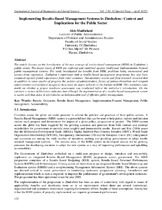| dc.contributor.author | Madhekeni, Alois | |
| dc.date.accessioned | 2019-08-19T06:57:36Z | |
| dc.date.available | 2019-08-19T06:57:36Z | |
| dc.date.issued | 2012 | |
| dc.identifier.citation | Madhekeni, A. (2012). Implementing Results-Based Management Systems in Zimbabwe: Context and Implications for the Public Sector. International Journal of Humanities and Social Science, 2(8): 122-129 | en_US |
| dc.identifier.uri | http://hdl.handle.net/10566/4801 | |
| dc.description.abstract | The article focuses on the introduction of the new concept of results-based management (RBM) in Zimbabwe’s public sector. The major tenets of RBM are explored and examined against traditional implementation-focused public management systems. The study investigated the benefits from RBM, problems being encountered and lessons from experience. Zimbabwe’s experience with a results-based management programme has also been examined against global experiences from other countries. Documentary search and field research revealed that in addition to some epochs of progress the politics of administration, forces of patron-clientelism and rampant administrative and technical incapacity have been the major setbacks to the fruition of RBM. This revelation casts doubt on whether a proper readiness assessment was conducted before the initiative’s introduction. On the contrary a review of literature indicates that although the implementation of a results-based management system is easier said than done, it still remains an indispensable tool of effective public management. | en_US |
| dc.language.iso | en | en_US |
| dc.publisher | International Journal of Humanities and Social Science | en_US |
| dc.subject | Public sector | en_US |
| dc.subject | Results-based management systems | en_US |
| dc.subject | Zimbabwe | en_US |
| dc.subject | Implementation | en_US |
| dc.title | Implementing results-based management systems in Zimbabwe: Context and implications for the public sector | en_US |
| dc.type | Article | en_US |

